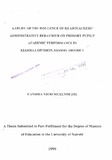| dc.description.abstract | This study investigated the influence of headteachers' administrative behaviour on primary pupils academic performance in Kiambaa Division, Kiambu District. Administrative behaviour was understood to encompass administrative practices or tasks which headteachers perform in the day to day running of the school. The Administrative tasks considered were: curriculum and instruction, pupil personnel, staff personnel, school-community relations, provision and maintenance of physical facilities, and financial management.
The purpose of the study was to: determine whether administrative tasks as performed by headteachers have any influence on pupils academic performances, identify problems
encountered by headteachers in carrying out their administrative tasks, establish whether there is
.,
any relationship between age, gender, academic qualifications, professional qualifications,
school sponsor and how headteachers perform administrative tasks.
Data was gathered using two questionnaires; one for the headteachers and the other for teachers. The study used ex post facto research design. The research instrument was validated by use of a pilot study which was assessed by two senior lecturers who are specialised in educational administration. The split half correction method and the Spearman-Brown prophesy formula was used to test the reliability of the instrument. The reliability of the instrument was found to be 0.92.
The population consisted of 41 headteachers and 816 teachers. Random sampling was used to select a sample from the population. The sample consisted of 36 headteachers and 73 teachers. The headteachers who responded to the questionnaire were 35 and teachers were 71 representing a return rate of97.2 percent and 97.3 percent respectively.
The tasks were measured in terms of the importance headteachers attach to administrative tasks and the frequency with which they perform these tasks. Pupils academic performance was measured in terms of the schools' means score attained at the end of eight years Kenya Certificate of Primary Education (K.C.P.E).
The study used both research questions and hypotheses. The research questions were analysed using frequencies and percentages. Hypothesis were tested by use of a chi-square test at 0.05 level of significance.
The following were the findings:
1. Headteachers attach high importance to administrative tasks. Curriculum and instruction, financial management, maintenance of physical facilities and staff personnel management were rated higher than the other tasks,
2. Headteachers perform tasks frequently and in some cases always spend time performing some of the tasks. Curriculum, staff personnel, financial management and procurement and maintenance of facilities were allocated more time than other tasks.
3. The way in which headteachers perform most administrative tasks influence pupils' academic performance.
4. The problems which headteachers encounter in the schools were found to affect pupils academic performance.
5. Most of the schools studied performed poorly in the K.C.P.E. Most of the reasons given for poor academic performance had to do with administrative practices of the head-teacher.
6. There was no significant relationship between headteachers' gender, age, academic qualifications, professional qualification, school sponsor and the way in which headteachers performed most of administrative tasks.
Vll
The recommendations made were as follows:-
1. Headteachers need not only attach high importance and all the administrative tasks, but also work towards efficiency and effectiveness.
2. The preparation of lessons, keeping of pupils record of performance need to be upheld alongside classroom supervision.
3. Class-size ought to be reduced to make it possible for teachers to give individualized attention to pupils.
4. A cordial relationship between teachers, parents, school community should be maintained to help pupils work towards higher performance. This could be enhanced by organising meetings. Such meetings would discuss the role of parents, pupils' discipline, means of acquiring funds how to curb truancy and dropouts and pupils performance.
5. Educational officers, school sponsors and headteachers should work together to ensure that both headteachers and teachers receive in service and refresher courses occasionally or as need arise, on all tasks.
6. Staffing officers should ensure that some schools are not understaffed while others are overstaffed. Frequent transfers especially in between the term should be avoided.
7. The T.S.C should equitably renumerate teachers, and teachers should be promoted according to class performance. There is also need for a gender balanced staff.
8. Headteachers, teachers and the school community should work together to ensure that the schools have adequate physical facilities and existing facilities are kept in good order.
9. Headteachers should be transparent and accountable as far as school funds are concerned. Auditors from the Ministry of Education should continuously help headteachers improve their skills in handling funds.
10. Means of dealing with the various problems need to be sought. The headteacher should consult with the various parties concerned with the school in order to achieve this goal.
There is need to conduct further study on:
1. the influence of teaching - learning materials and physical facilities on pupils academic performance.
2. the causes of truancy and drop-outs in schools
3. the current study could be replicated to cover a larger population. | en |

